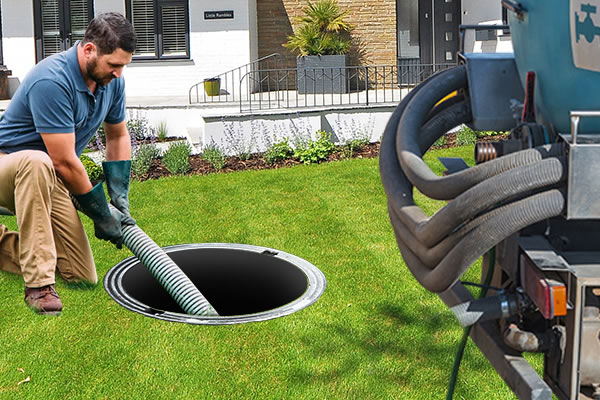
02
A properly functioning septic system is crucial for any home or business that relies on it for wastewater management. However, unexpected blockages can lead to costly repairs and system failures. While most people know to avoid flushing non-biodegradable items like wipes or feminine hygiene products, there are some unusual septic tank blockages that can still cause significant problems. Understanding these issues and scheduling regular septic tank pumping, septic tank cleaning, and maintenance can help keep your system in top shape.
Many homeowners believe that pouring grease down the sink in small amounts won’t harm their plumbing. However, grease solidifies over time, coating the inside of pipes and leading to clogs. Once it reaches the septic tank, it can form a thick layer of scum that prevents proper wastewater separation. This buildup can reduce the efficiency of the tank and even lead to backups in your home. Regular septic tank pumping can remove grease accumulation before it becomes a serious issue.
Despite being labeled as "flushable," many wipes do not break down properly in a septic system. Unlike toilet paper, which disintegrates quickly, these wipes remain intact and can create blockages in pipes, filters, and even the tank itself. Over time, a buildup of wipes can result in costly repairs and require emergency septic tank cleaning.
While antibacterial soaps and cleaning agents help keep your home germ-free, they can disrupt the natural bacteria balance in your septic tank. The beneficial bacteria in the tank break down waste, allowing the system to function efficiently. Overuse of antibacterial products can kill these essential bacteria, leading to waste buildup and potential clogs. Using septic-safe cleaning products and scheduling septic tank pumping in Rock Hill, NC when needed can help maintain a healthy balance.
Tree roots are one of the most unexpected causes of septic tank blockages. If a tree is planted too close to the septic system, its roots can grow into the pipes in search of water and nutrients. These roots can crack pipes, create obstructions, and even damage the tank itself. During septic tank installation, it’s crucial to position the tank and drain field away from large trees to prevent future problems.
It’s not uncommon for children to accidentally flush small toys, jewelry, or other objects down the toilet. While these items may not immediately cause a blockage, they can get lodged in the septic system, leading to bigger problems over time. Educating family members on what should and shouldn’t be flushed is essential for preventing unnecessary clogs.
Too much laundry detergent, especially non-biodegradable varieties, can lead to soap scum buildup in pipes and the septic tank. Similarly, liquid fabric softeners contain oils and chemicals that can contribute to system clogs. Using septic-safe laundry products and reducing detergent use can help keep your septic system running smoothly.
Schedule Regular Septic Tank Pumping: Routine pumping removes sludge and prevents blockages. Most tanks need to be pumped every 3-5 years, depending on household size and usage.
Perform Routine Septic Tank Cleaning: Cleaning removes built-up debris and ensures your system functions efficiently.
Be Mindful of What You Flush: Stick to septic-safe toilet paper and avoid flushing anything that doesn’t break down easily.
Use Bacteria Additives if Necessary: Some products can help maintain a healthy bacterial balance in your tank.
Monitor Landscaping: Avoid planting trees near your septic system to prevent root intrusion.
Hire Professionals for Septic Tank Installation: A properly installed system reduces the risk of blockages and ensures long-term efficiency.
Septic system blockages can be caused by a variety of unexpected factors, from tree roots to antibacterial cleaners. Regular septic tank cleaning, pumping, and careful monitoring of what enters your system can help prevent costly repairs. If you suspect a blockage, it’s best to call a professional at Charlotte Septic Pros to assess the situation before it leads to serious damage. By taking proactive steps, you can keep your septic system functioning efficiently for years.

22
Can Bacteria Additives Eliminate the Need for Pumping? If you own a home with a septic system, you’ve probably seen…
Read more
12
A single slow drain in your home can feel like a minor inconvenience. Maybe the sink takes a little longer…
Read more
05
Are Slow Drains a Septic Issue or Just a Clog? Slow drains are one of those household problems that start…
Read more
02
What Septic Service Techs See That Homeowners Miss Most homeowners only think about their septic system when something goes wrong.…
Read more
21
Simple Habits That Protect Your Septic System A well-functioning septic system does its job quietly, but the moment something goes…
Read more
14
Pump Now or Pay Later: The Real Cost of Skipping Maintenance A properly functioning septic system is easy to forget…
Read more
11
Why Your Septic System Always Acts Up at the Worst Time Homeowners often feel that septic problems strike at the…
Read more
04
Early Warning Signs Your Septic Tank Needs Pumping For homeowners who rely on a septic system, routine maintenance is not…
Read more
29
Why Does My Septic System Smell Fine One Day and Terrible the Next? If you own a home with a…
Read more
19
Is Your Septic System Overdue? Simple Home Checks You Can Do Today For many homeowners, the septic system is a…
Read more